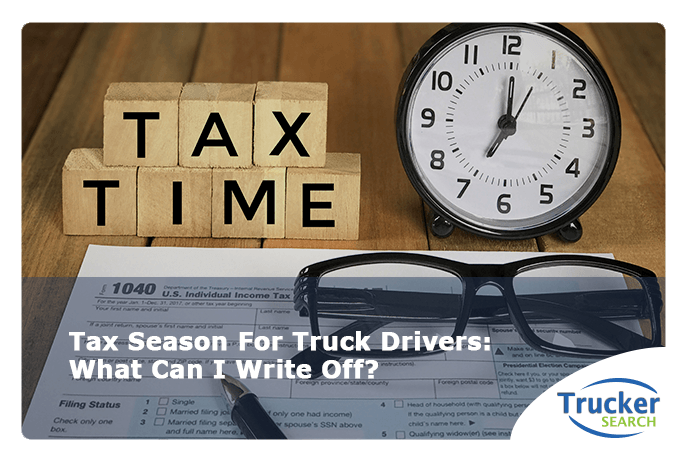Tax season is right around the corner! For truck drivers, this can be a daunting process. What items can you write off on your taxes and what items can you not write off? While a professional tax preparer is the best and safest way to do your taxes, you can do a lot of the tax preparation yourself. There are, however, a few guidelines that you need to be aware of if you’re going to do your taxes yourself.
A recent change that could affect you is that the Tax Cuts and Jobs Act has changed how some truck drivers can do their taxes if they receive a W-2. The Job-Related Travel Expenses (Form 2106) is no longer available due to the Tax Cuts and Jobs Act. Truck drivers that receive a W-2 cannot deduct certain items from their taxes anymore such as mileage and travel expenses.
If you do not receive a W-2, and fall under the independent contractor category for tax purposes, you can still claim business expenses on your tax return. Truck drivers who are independent contractors can claim a variety of tax deductions that relate to the expenses that arise from being a truck driver. We have compiled a list of all the work and travel related expenses that you can write off on your taxes as an independent contractor truck driver.
Your deductible items that you could report to the IRS at tax time include:
Accounting Fees
Administrative Fees
Air Freshener
Alarm Clocks
Antennas
ArmorAll
Atlas
Bank/ATM Fees
Batteries
Briefcase
Brokerage/Factoring Fees
Broom/Dust Pan
Bunk Heater
Cab Curtains
Cab/Bus Fare & Car Rental
Calculator
Camera
CB Radio
CDL
Cell Phone Bill
Check Cashing Fee
Cigarette Plug-in
Circuit Tester
Cleaning Supplies
Clipboard
ComCheck Fees
Computer Expense
Copies
Crowbar
?De-Icer
Disinfectant
Duct Tape
Electrical Tape
Fax
First Aid Supplies
Flashlight
Floor Mats
Form 2290 Tax PD
Fuel Expense
Fuel Paid
Fumigate Trailer
Gloves-work
GPS
Hand Cleaner
Hangers
Hard Hat
Insurance – Health
Insurance – Trailer
Insurance – Truck
Insurance – W/C
Internet Fees
?Jack Strap
Lap Desk
Laundry Bag
Laundry Expense
?Lease Equip
Legal Expense (not fines)
License Plates
?Log Book/Cover
Lumper Fees
Magnifying Glass
Map Light
Maps
Meals & Entertainment
Medical
Money Order Exp.
Motel/Hotel Expense
Office Supplies
Oil and/or Additives
Paper Towels
Parking
Payroll Expense
Permits
Physical (DOT)
Pillow
Postage
Power Booster
Power Cord
PrePass
Professional Fees
Qualcomm
Radio (Sirius, XM)
Rain Gear
Receipt Book
Safety Boots
Safety Clothing
Safety Glasses
Scale Tickets
Seat Covers
Security
Sheets
Shift Grip
Showers
Sleeping bag
Sleeping Fan
Sunglasses
Thermal Underwear
Tie Downs
Toiletries
Tolls
Tools/Equipment
Towels
Towing
Trailer Lease Payment
Trash Bags
Travel Expense
Travel Bags
Trip Charges
Truck Cables
Truck Lease Payment
Truck Magazine
Truck Repair & Maintenance
Truck Parts
Truck Tires
Truck/Trailer Storage
Truck Washes
Uniforms (if required)
Vacuum (portable)
WD-40
Window Screen
With a list of deductible items like this, you can go back through your travel and work expenses to find items, such as these, to write off on your taxes. If you haven’t kept an accurate record of your work-related expenses, this list can also help you know which receipts to hold onto for next year’s taxes.


